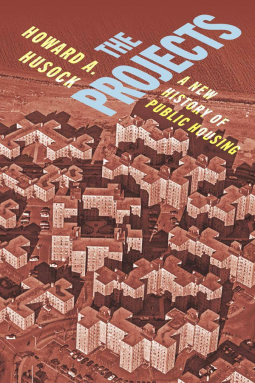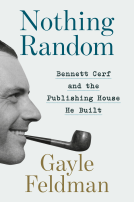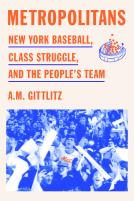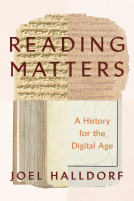
The Projects
A New History of Public Housing
by Howard A. Husock
This title was previously available on NetGalley and is now archived.
Send NetGalley books directly to your Kindle or Kindle app
1
To read on a Kindle or Kindle app, please add kindle@netgalley.com as an approved email address to receive files in your Amazon account. Click here for step-by-step instructions.
2
Also find your Kindle email address within your Amazon account, and enter it here.
Pub Date Sep 09 2025 | Archive Date Sep 23 2025
Talking about this book? Use #TheProjects #NetGalley. More hashtag tips!
Description
How housing policy failed the people it was designed to help — and how to fix it
As the US struggles to provide affordable housing, millions of Americans live in deteriorating public housing projects, enduring the mistakes of past housing policy. In The Projects, Howard A. Husock explains how we got here, detailing the tragic rise and fall of public housing and the pitfalls of other subsidy programs. He takes us inside a progressive movement led by a group of New York City philanthropists, politicians, and business magnates who first championed public housing as a solution to urban blight. From First Lady Eleanor Roosevelt to the controversial city planner Robert Moses, many well-known historical figures made a convincing case for affordable housing in America.
Despite the movement’s lofty ideals, the creation of the Projects led to the destruction of low-income communities across the country. From the Hill District in Pittsburgh to Black Bottom in Detroit, predominantly Black neighborhoods were judged only by the quality of their housing. Husock looks beyond these neighborhoods’ physical conditions to their uncounted riches, from local artists like August Wilson to vital community institutions. As he shares residents’ stories, he honors what they crafted through their own plans, rather than those of city planners.
Husock traces the history of public housing to contemporary debates on the government’s role in the housing market. Through interviews with residents, he reveals how public housing transformed the lives of Americans and the physical faces of cities and towns. He ultimately critiques "repair and reform" efforts, making policy recommendations that address the core failings of public housing for the people it was once designed to help. Mapping out a better path for policy-makers, he lays a new foundation for upward mobility in America.
Available Editions
| EDITION | Other Format |
| ISBN | 9781479828432 |
| PRICE | $29.95 (USD) |
| PAGES | 240 |
Available on NetGalley
Average rating from 13 members
Featured Reviews
Gotta say, I'm a sucker for a good book on public housing. During my many years studying urban planning I've always had a soft spot for housing...so why did I get a cert in historic preservation instead? No one knows.
In The Projects, Husock offers a sharp, often critical, reassessment of the history and legacy of public housing in the U.S. Husock argues that the public housing model was flawed from the beginning, built on ideals that often ignored the realities of human behavior and community dynamics.
He traces the arc from New Deal optimism to the eventual dysfunction of places like Pruitt-Igoe and Cabrini-Green, painting a picture of how concentrated poverty and government bureaucracy failed the very people these policies were meant to help (supposedly).
What makes this book compelling is Husock's way of bringing historical case studies to life. He tells stories of residents, reformers, and architects, showing both the hope and the heartbreak baked into these massive urban experiments. He’s clearly skeptical of large scale government housing (and so am I), but whether or not you agree with his conclusions, the questions he raises are important.
That said, the ideological tone might not be for everyone. Husock leans heavily on a market-oriented critique, and at times it feels like structural factors (like racism and economic inequality) get less attention than they deserve.
Still, this is a thought provoking, well researched read for anyone interested in urban planning, housing, or social policy. It doesn’t just revisit the history of “the projects”, it challenges us to rethink what good policy should look like going forward.
 Marcy H, Reviewer
Marcy H, Reviewer
The Projects have come to be known as the home for those in poverty, full of drugs and gangs. However, in this book, Husock discusses the idealistic start of federally-funded housing and the dream of it being a stepping stone for people to launch themselves into a more affluent and financially secure future. Unfortunately, these plans were flawed from the start, as the building of the Projects first meant clearing out the “slums” which included entire families, businesses, churches and social groups. The buildings weren’t well-made or well-maintained, and 50 years after they were built, many of them had already been torn down. What I liked about Husock’s approach to his writing was that he not only discussed the start of the projects, where they ended up and how they got there, but he didn’t lose track of the very real humans that had to navigate losing their homes in the slums and having to start over. Housing is, at its core, a very human-centric issue and we must not forget about the people that live, raise families and try to form a community in this environment.
Book Review: The Projects: A New History of Public Housing by Howard A. Husock
A Nuanced Exploration of Public Housing’s Evolution and Challenges
Howard A. Husock’s The Projects: A New History of Public Housing is a meticulously researched and thought-provoking examination of one of America’s most complex social endeavors. By tracing the history of public housing from its idealistic origins to its current state, Husock sheds light on the unintended consequences, societal shifts, and policy decisions that have shaped this critical aspect of urban life. The result is a narrative that is as much about the people who lived in these projects as it is about the policies that governed them.
Key Strengths
-Historical Depth: Husock’s thorough research provides a rich historical context, making the book an invaluable resource for understanding the evolution of public housing.
-Analytical Insight: The author critically examines the social and economic factors that influenced public housing, offering a balanced perspective on its successes and failures.
-Thematic Relevance: The book resonates with contemporary discussions on affordable housing, urban development, and social welfare, making it highly relevant to current debates.
Potential Considerations
-Pacing: Some readers may find the detailed historical sections slow, though they lay the groundwork for the book’s broader arguments.
-Policy Focus: While Husock provides a comprehensive analysis, some readers might crave more concrete solutions or policy recommendations.
Score Breakdown (Out of 5)
-Historical Insight: ⭐⭐⭐⭐⭐ (5/5) – A masterful excavation of public housing’s past, revealing its complexities.
-Analytical Rigor: ⭐⭐⭐⭐ (4/5) – Husock’s analysis is thorough and thought-provoking.
-Relevance to Contemporary Issues: ⭐⭐⭐⭐✨ (4.5/5) – The book is a timely contribution to ongoing debates.
-Narrative Flow: ⭐⭐⭐✨ (3.5/5) – While informative, some sections feel dense.
Overall: ⭐⭐⭐⭐ (4/5) – A blueprint for understanding the tangled threads of public housing’s history.
Ideal Audience
-Scholars and researchers in urban studies, sociology, and history.
-Policymakers and advocates for affordable housing and urban development and community planning.
-Anyone interested in the complexities of urban America and the role of public housing.
Gratitude
Thank you to NetGalley and Howard A. Husock for the advance review copy. The Projects: A New History of Public Housing is a compelling and insightful work that challenges readers to rethink the narratives surrounding public housing.
Note: Review based on an ARC; minor refinements may appear in the final edition.
 William E, Librarian
William E, Librarian
With this book, Husock makes an explicit case for allowing the poorest Americans to rot away in slums or on the streets as punishment for their failure to make the choices Husock believes can lead to upward mobility. Dripping with contempt and racism directed at poor people, he obscures the role that developers, bankers, and business elites played in shaping urban policy and lays the blame at the feet of a handful of reformers and bureaucrats. Full of contradictions, Husock's account is aimed at one goal: undermining the idea that, in the richest country in the history of the world, shelter can and should be available to all people.
Important History That Should Spark Needed Discussion. First up, I fully admit I am *far* from a public housing expert of any kind. I read books like this to learn about issues, not because I already know about them. The closest first hand knowledge I have of any of this is growing up in Exurban Atlanta and being generally aware of the Atlanta news... right as the Atlanta Projects were coming down and being rethought in the late 90s/ early 2000s around the time of the Olympic Games in Atlanta. And even then, even while working with a community service oriented collegiate honor society throughout my college years in this period, while we worked a lot with various "community revitalization" efforts, we never really worked in the Projects. Maybe some other Atlanta chapters did (Georgia Tech, Morehouse, Spelman, etc), but my school just in the suburbs (Kennesaw State) didn't.
All of that tangential personal history dealt with, the actual text here is great for sparking discussion on a few different, yet mostly related, topics... but the text here is also written almost as a textbook. It *feels* like something you would actually take a class on with this as the text and expect to be quizzed and tested about the various people and dates and movements and philosophies and such, yet it isn't as dry and formal as an actual academic paper tends to be. It is one of those University Press (NYU, in this case) titles that seems truly destined to be *most* read as a textbook, very nearly explicitly designed for exactly that... and yet it *should* be read by a much wider audience, particularly among the "leader" / "influencer" / "organizer" set, because it really does have some interesting things to say about the entire history up to 2023 or so - and, somewhat, of the potential future - of public housing in the United States.
Among the discussions relevant here are the Nazi-based origins of public housing as we now know it in the 2020s - literally, the leaders who first proposed the national laws that led to the Projects openly praised Adolf Hitler and many of his acolytes of the late 1920s/ early 1930s - when their antisemitism and violence was already clear, but well before their "final solution" began. How can we openly embrace the freedom and diversity we claim to hold so dear in the US in the 2020s while also advocating for ideas that are in places almost word for word out of Hitler's own mouth?
Another discussion point that Husock actually does a truly phenomenal job of exploring, even if a touch tangentially, is reparations. No, not for slavery - by and large, clear records of that don't exist and the people directly affected by it are long dead. HOWEVER, the black communities whose property was effectively stolen -via so-called "eminent domain", where the government can dictate the price it will pay you for your land - ... this happened in the 1930s and later. We have actual property records of those who owned that land at that time. While many of the owners themselves are now dead, as many of them would have been born around the turn of the 20th century, some of the later ones - the projects built more in the "golden era", as Husock describes it, of the 1950s and early 1960s... some of those original owners *may* still be alive. In either case, it is very likely that direct legal heirs of many of these people - their kids, grandkids, or even great-grandkids - are very much alive today and could be more adequately compensated for what was taken from their near ancestor. In theory, this could be seen as a just remediation for sins that while in the past, are still recent enough to bear accurate justification. Obviously, this would have to be more completely thought through and debated by those with far more knowledge of the specifics than I have, and likely far greater philosophers and ethicists than I will ever begin to approach claiming to be, but I do believe that Husock lays the basic groundwork for such conversations quite well in this text, and it should be read for this if for no other reason.
The final major discussion that Husock leads to here in the text is actually the very original discussion - what, if anything, should be done regarding public housing: Who should fund it, who should manage it, who should benefit from it, *is it possible* to truly benefit from it, under what conditions can it be successful, what is "successful public housing", etc?
Husock makes clear that in certain times and places - even in this Millennium - public housing *has* worked and *can* work - but he also makes equally clear that the realities of public housing have rarely lived up to the ideals and goals of its proponents.
Read this book. Even if you yourself happen to be a public housing expert, you're still likely to learn at leasta few things here. Write your own review of this book. And, perhaps more importantly, write to your governmental "leaders" at every level from your local City Councilman (as Housing Authorities are run by local leaders) all the way through your Congressman and even the President (as Federal policy is set in DC) and let them know your thoughts after reading it. Maybe, just maybe, we can actually get these discussions had in the manner than they are due.
Oh, and the star deduction? The bibliography clocked in at just 11% or so, which is short of even my recently relaxed standard of 15%.
Very much recommended.
I loved this multifaceted historical examination of public housing. It was fascinating to see how well intentioned people got policy so wrong. A valuable lesson for progressives who often let theory get in the way of reality. I particularly enjoyed the examination of cultural communities that emerged in these much maligned buildings/neighborhoods. A useful reminder that the lives of people should never be judged exclusively by their address.


















